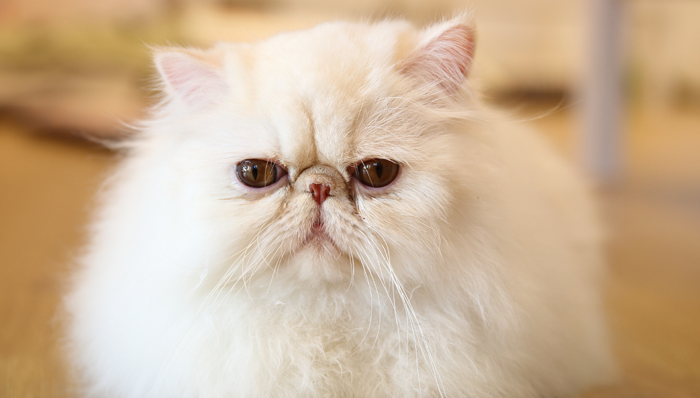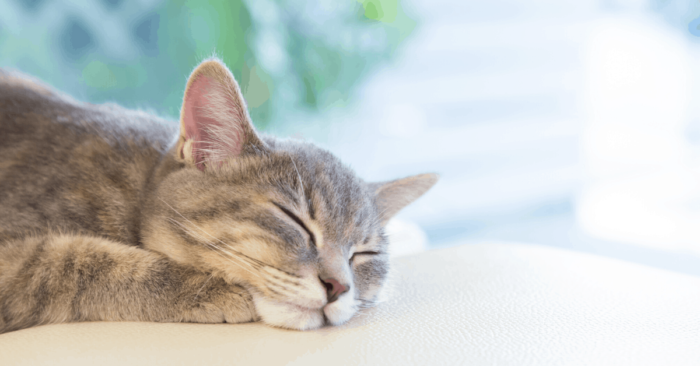We all know that our feline friends love to sleep a lot. On average, a cat can sleep for a very long time ranging from 12 to 16 hours on a daily basis. While they sleep, many pet parents have complained that they hear their cats snoring. Cat snoring has raised a lot of questions among pet parents. Many want to know whether the behavior is a normal one or if they should be worried.
Table of Contents
Do cats snore while sleeping?
When your feline friend is in deep sleep, it is likely to start emitting snoring sounds. As the kitty’s body relaxes, it has the same effect on the soft tissues surrounding the passageways of both its nose and throat.
The base of the nasal passage in humans harbors a loose flap of skin and so do cats. This flap of skin is very useful in breathing as it allows the passage of air, and stops water from entering up the nose when you gulp down water. This flap is what vibrates when you fall into a relaxed sleep that causes snoring in both cats and humans. The shape of the face and head are factors that can affect the position and size of this flap. This is the reason why some animals are susceptible to snoring and others are not.
Should I be worried if my cat snores?
Most times, cat snoring is never something to worry about, especially if you know your kitty to be a regular snorer. Besides, if no symptoms accompany the snoring, then no worries.
Symptoms that can make you get worried if they accompany snoring include;
- Discharge from the feline’s eyes or nose may be an indication of respiratory infection in the pet
- Pet parents should endeavor to monitor their feline companions for behavioral changes; this can include apathy, lethargy, or even changes in drinking or eating habits. If any of those symptoms are noticed, be sure to visit the vet for proper evaluation
- You should be really worried if symptoms like labored breathing, coughing with great effort, panting, and gasping for air with the neck extended are noticed. This is definitely the time to seek the assistance of a vet
- In the absence of your vet, seek help from emergency vet clinics – it may be that a tumor has lodged inside the airways, causing constant snoring in your cat and it is only a vet that can properly evaluate the cat and proffer workable solutions
What does it mean if my cat snores?
Members of the feline population have sleep cycles just like human beings. When you notice your feline friend jerking their facial muscles, twitching, or displaying ‘running’ feet, It only means that the kitty is in the REM (Rapid Eye Movement) phase of sleep.
The felines also experience a deeper, non-REM sleep phase – this is the time when they are fully relaxed and it is precisely when pet parents are likely to hear them make snoring sounds.
These are possible reasons why cats snore
There are a plethora of reasons that can lead to snoring in cats but we have listed the most common ones below.
Nose shape
Now, what is the shape of your kitty’s nose? How a cat’s nose is shaped, including the sinus passages have an effect on the movement of air in and out of the nasal passage. A brachycephalic breed such as a Persian cat is susceptible to snoring by nature.
Brachycephalic breed

The Brachycephalic cat breeds include such kitties as Persians, Himalayan, Burmese – these are often prone to snoring. The word Brachycephalic” is a blend of two words – “brachy” means shortened while “cephalic” means head.
With that said, the bones of the skull of brachycephalic cats come shortened in length – this gives both the face and nose of the cat a pushed-in appearance. These cats hence have shortened nasal passage and needless to say, they frequently develop breathing problems, this includes snoring.
Overweight
When a cat becomes overweight, excessive fats predispose it to snore. The cat’s airways will carry the burden of deposits of excessive fats in the tissues around its upper airways. This is among the reasons pet parents should ensure that their canine companion does not get too fat.
Sleeping position
During sleep, some cats that are extremely flexible can assume the most unbelievable positions. Sometimes, these awkward sleeping positions can cause cats to snore. If the snoring is a result of sleeping posture, then, it is not expected to last for a long time and should stop immediately after the feline changes its sleeping position.
Respiratory issues
Respiratory illnesses can include the likes of bacterial or fungal infections. Even asthma can also lead to snoring. There are other symptoms of a respiratory infection such as discharge from the nose and eyes, sneezing, and coughing, including decreased activity.
Presence of foreign objects
When foreign objects like blades of grass lodge in the back of a cat’s nose or mouth, it does not just trigger snoring but also activates agitation and coughing.
Age
When it comes to the feline population, age is a factor in determining whether a cat can snore or not. Old age comes with an increase in fat and loss of muscle tone; both narrow the airways. With that said, older cats are expected to snore more than kittens. When kittens start snoring, it is usually taken more seriously than adults.
The list is not comprehensive but we must mention that there are other factors that can lead to snoring in cats, they include – allergies, inflammation, polyps or masses, and trauma.
Read Also; How Many Nipples Do Cats Have? Demystifying The Myths
Are there cat breeds that snore more than others?
Brachycephalic cats like Persians can snore more than other breeds of canine – the reason is that the breed comes with flattened facial features or a short muzzle. This condition can lead to smaller nostrils, a lengthened soft palate, or a windpipe that is narrower. This is the reason behind the excessive snoring habit of flat-faced cats.
Even with that genetic fault, any brachycephalic cat that is displaying symptoms like excessive coughing, noisy breathing while awake, routinely taking breaths through its mouth, or gags must be taken to the vet immediately to ease its breathing.
